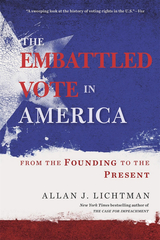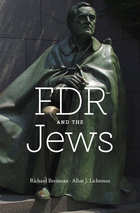
“A sweeping look at the history of voting rights in the U.S.”—Vox
Who has the right to vote? And who benefits from exclusion?
For most of American history, the right to vote has been a privilege restricted by wealth, sex, race, and literacy. Economic qualifications were finally eliminated in the nineteenth century, but the ideal of a white man’s republic persisted long after that. Women and racial minorities had to fight hard and creatively to secure their voice, but voter identification laws, registration requirements, and voter purges continue to prevent millions of American citizens from voting.
An award-winning historian and voting right activist, Allan Lichtman gives us the history behind today’s headlines. He shows that political gerrymandering and outrageous attempts at voter suppression have been a fixture of American democracy—but so have efforts to fight back and ensure that every citizen’s voice be heard.
“Lichtman uses history to contextualize the fix we’re in today. Each party gropes for advantage by fiddling with the franchise… Growing outrage, he thinks, could ignite demands for change. With luck, this fine history might just help to fan the flame.”
—New York Times Book Review
“The great value of Lichtman’s book is the way it puts today’s right-wing voter suppression efforts in their historical setting. He identifies the current push as the third crackdown on African-American voting rights in our history.”
—Michael Tomasky, New York Review of Books

Nearly seventy-five years after World War II, a contentious debate lingers over whether Franklin Delano Roosevelt turned his back on the Jews of Hitler's Europe. Defenders claim that FDR saved millions of potential victims by defeating Nazi Germany. Others revile him as morally indifferent and indict him for keeping America's gates closed to Jewish refugees and failing to bomb Auschwitz's gas chambers.
In an extensive examination of this impassioned debate, Richard Breitman and Allan J. Lichtman find that the president was neither savior nor bystander. In FDR and the Jews, they draw upon many new primary sources to offer an intriguing portrait of a consummate politician-compassionate but also pragmatic-struggling with opposing priorities under perilous conditions. For most of his presidency Roosevelt indeed did little to aid the imperiled Jews of Europe. He put domestic policy priorities ahead of helping Jews and deferred to others' fears of an anti-Semitic backlash. Yet he also acted decisively at times to rescue Jews, often withstanding contrary pressures from his advisers and the American public. Even Jewish citizens who petitioned the president could not agree on how best to aid their co-religionists abroad.
Though his actions may seem inadequate in retrospect, the authors bring to light a concerned leader whose efforts on behalf of Jews were far greater than those of any other world figure. His moral position was tempered by the political realities of depression and war, a conflict all too familiar to American politicians in the twenty-first century.
READERS
Browse our collection.
PUBLISHERS
See BiblioVault's publisher services.
STUDENT SERVICES
Files for college accessibility offices.
UChicago Accessibility Resources
home | accessibility | search | about | contact us
BiblioVault ® 2001 - 2024
The University of Chicago Press









